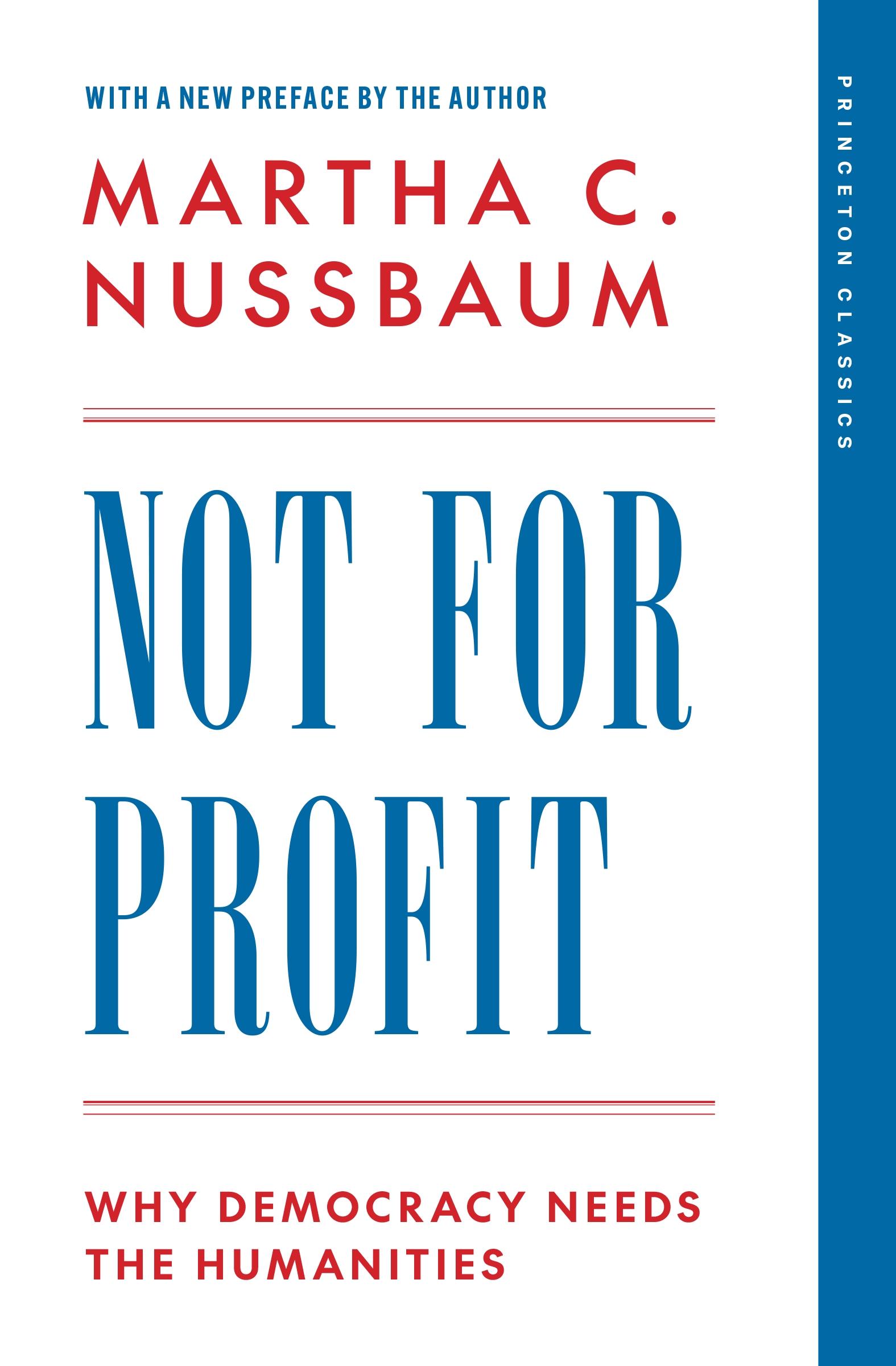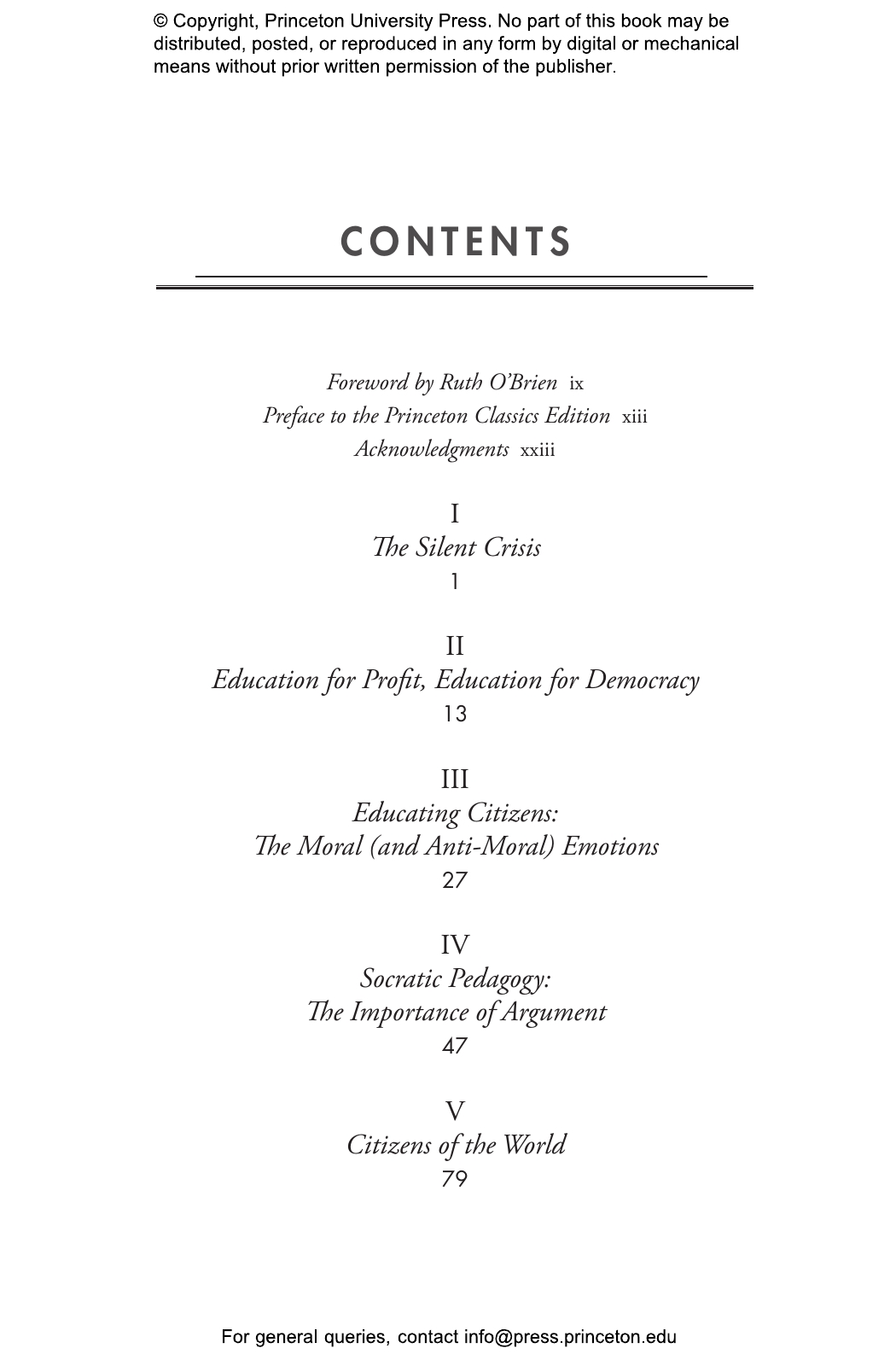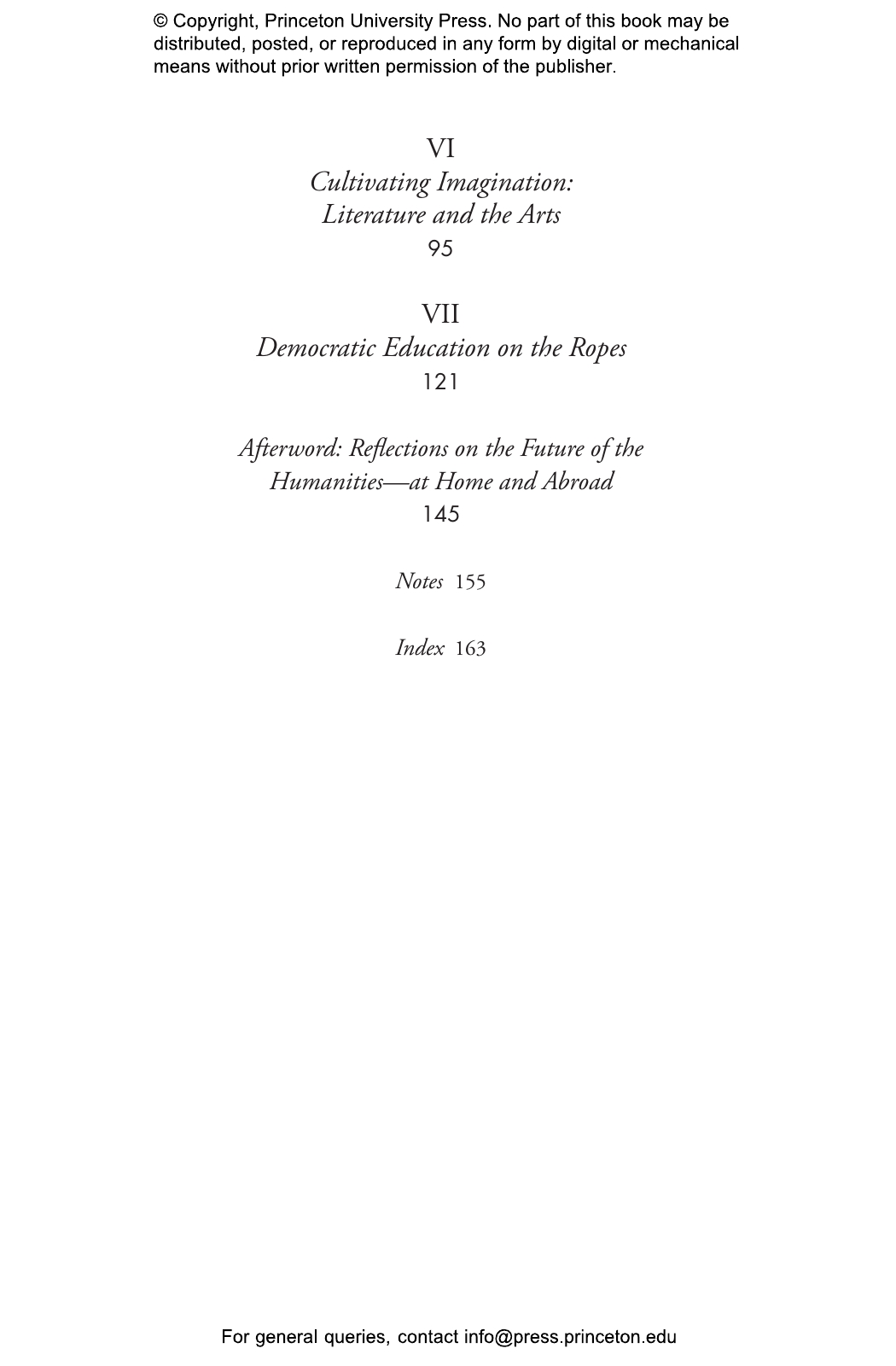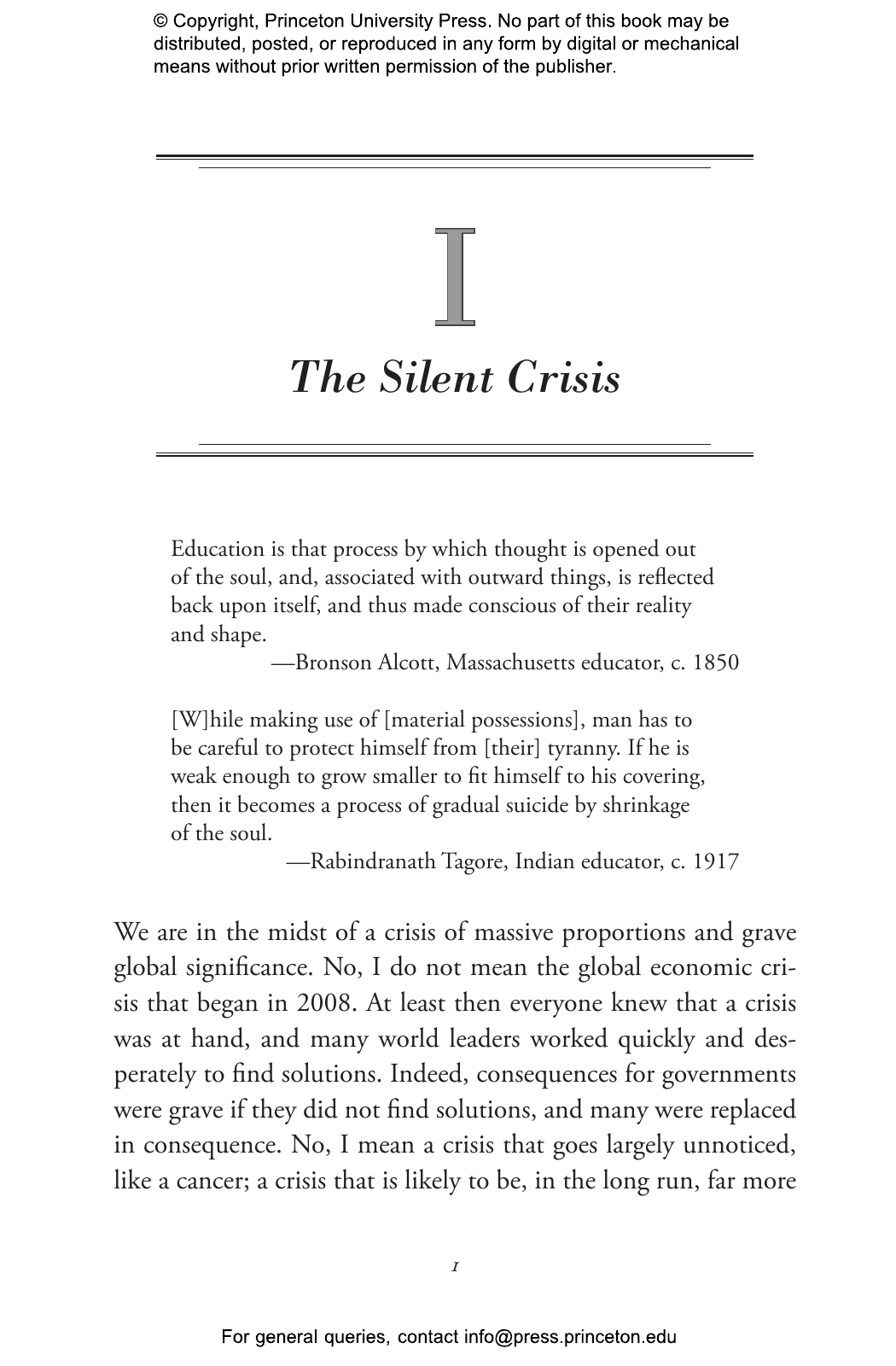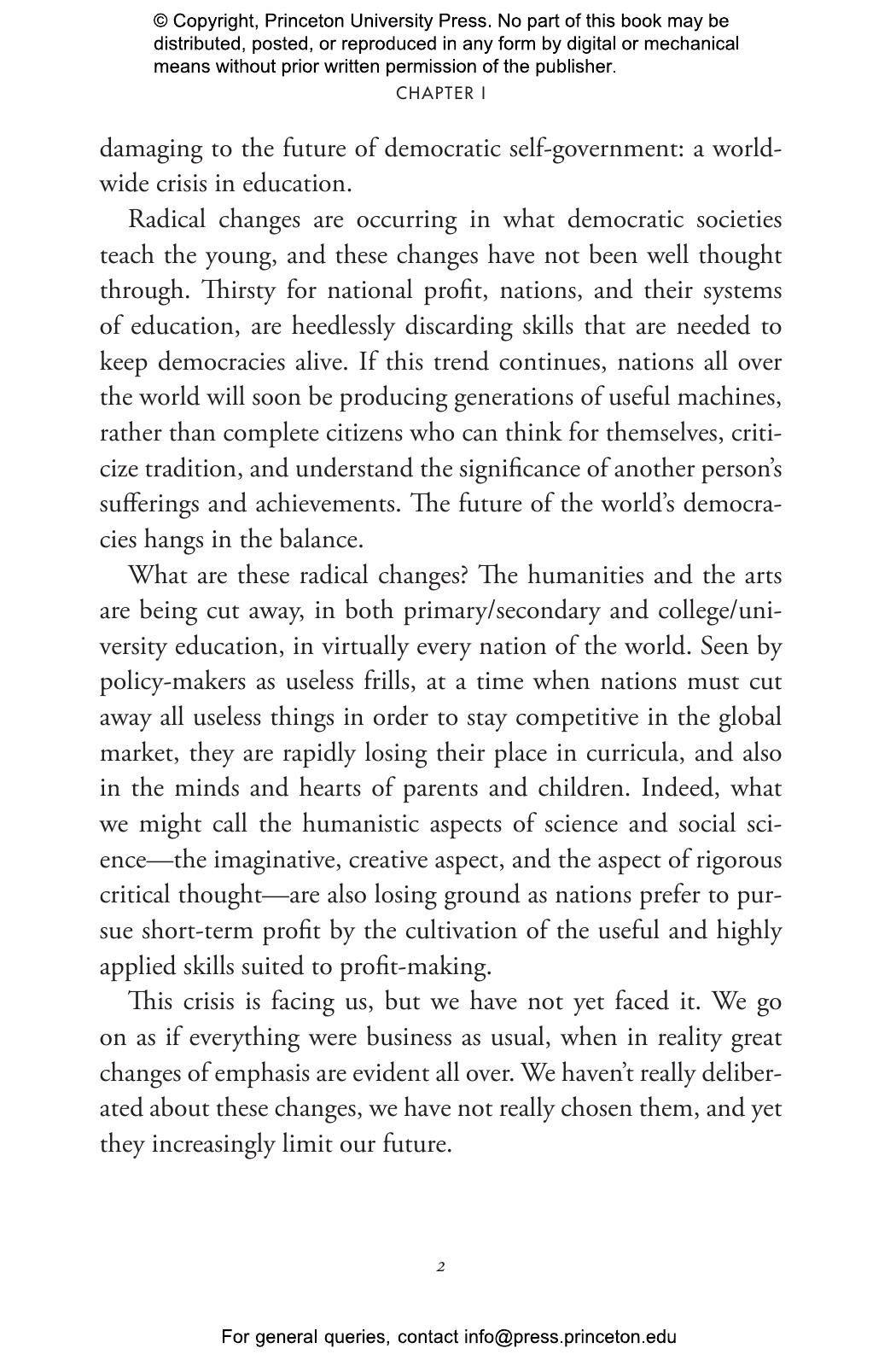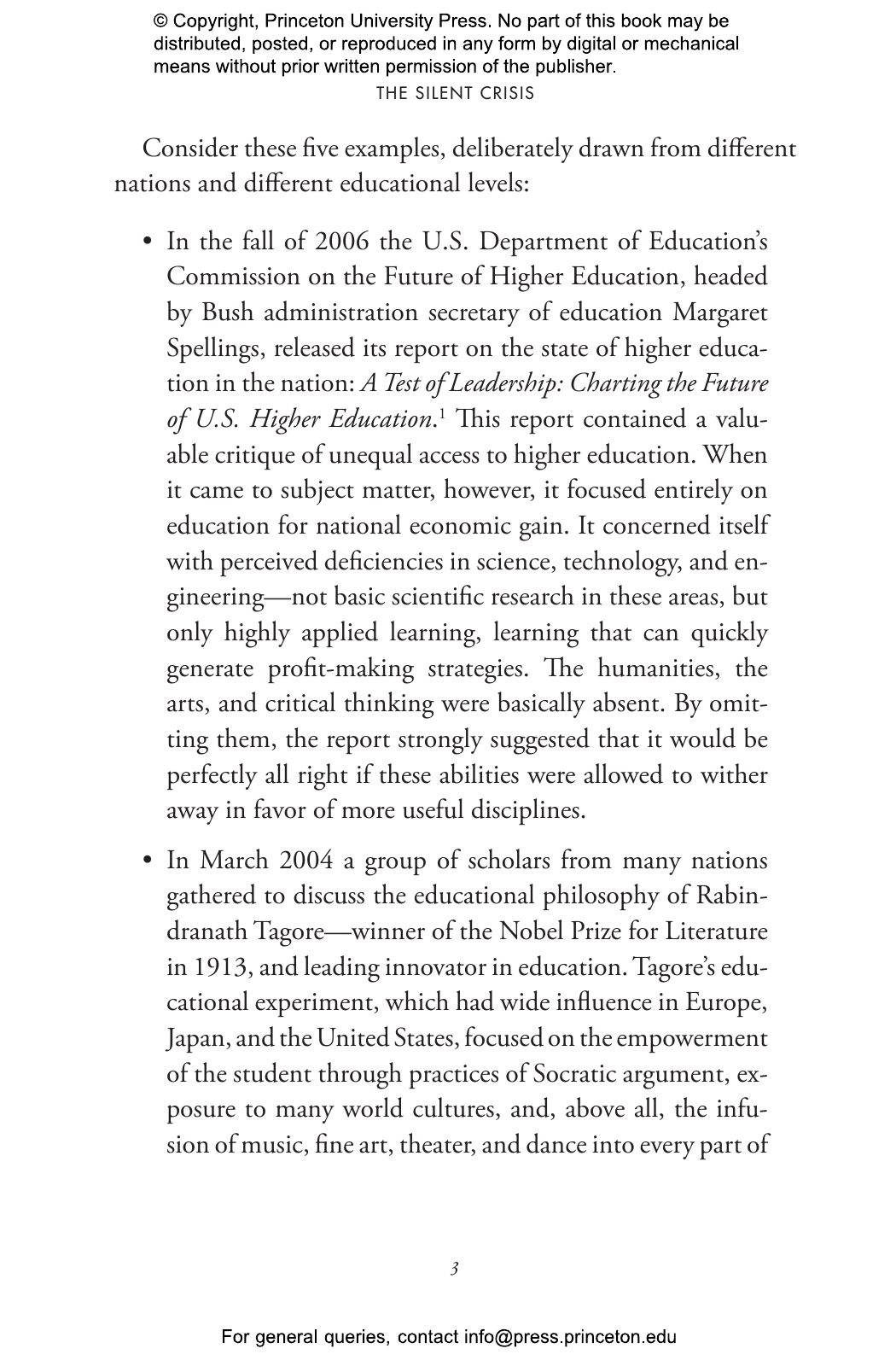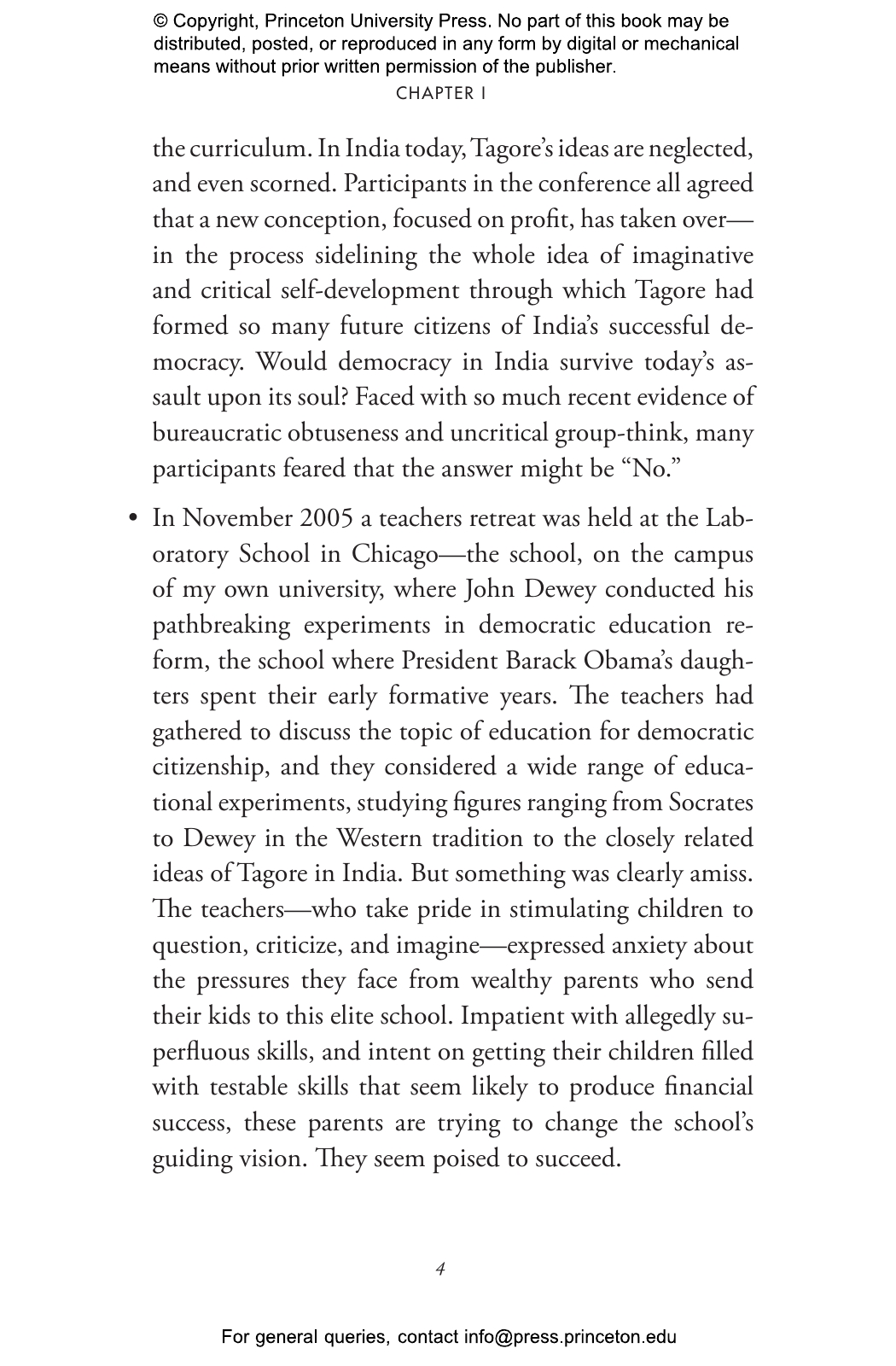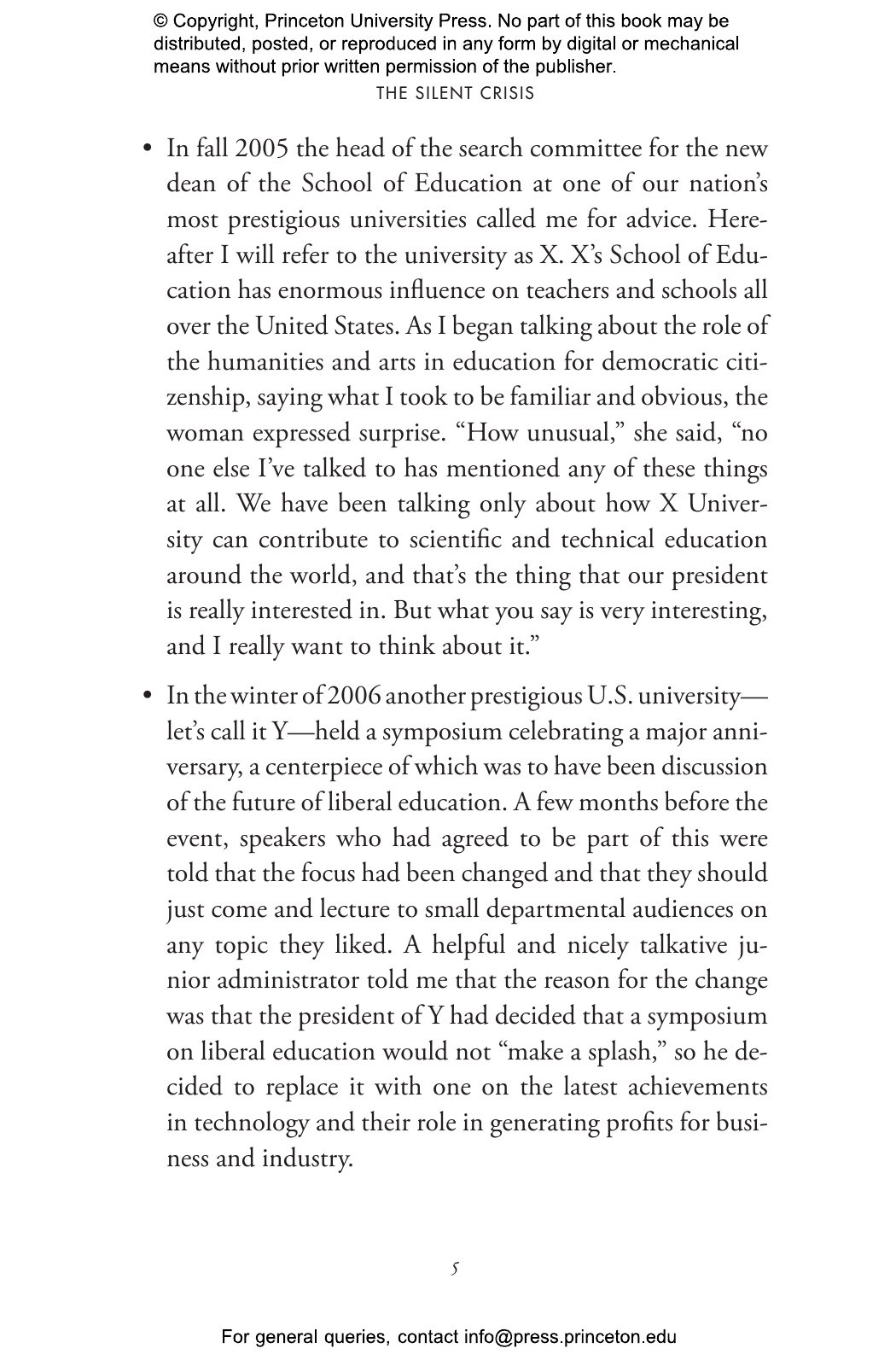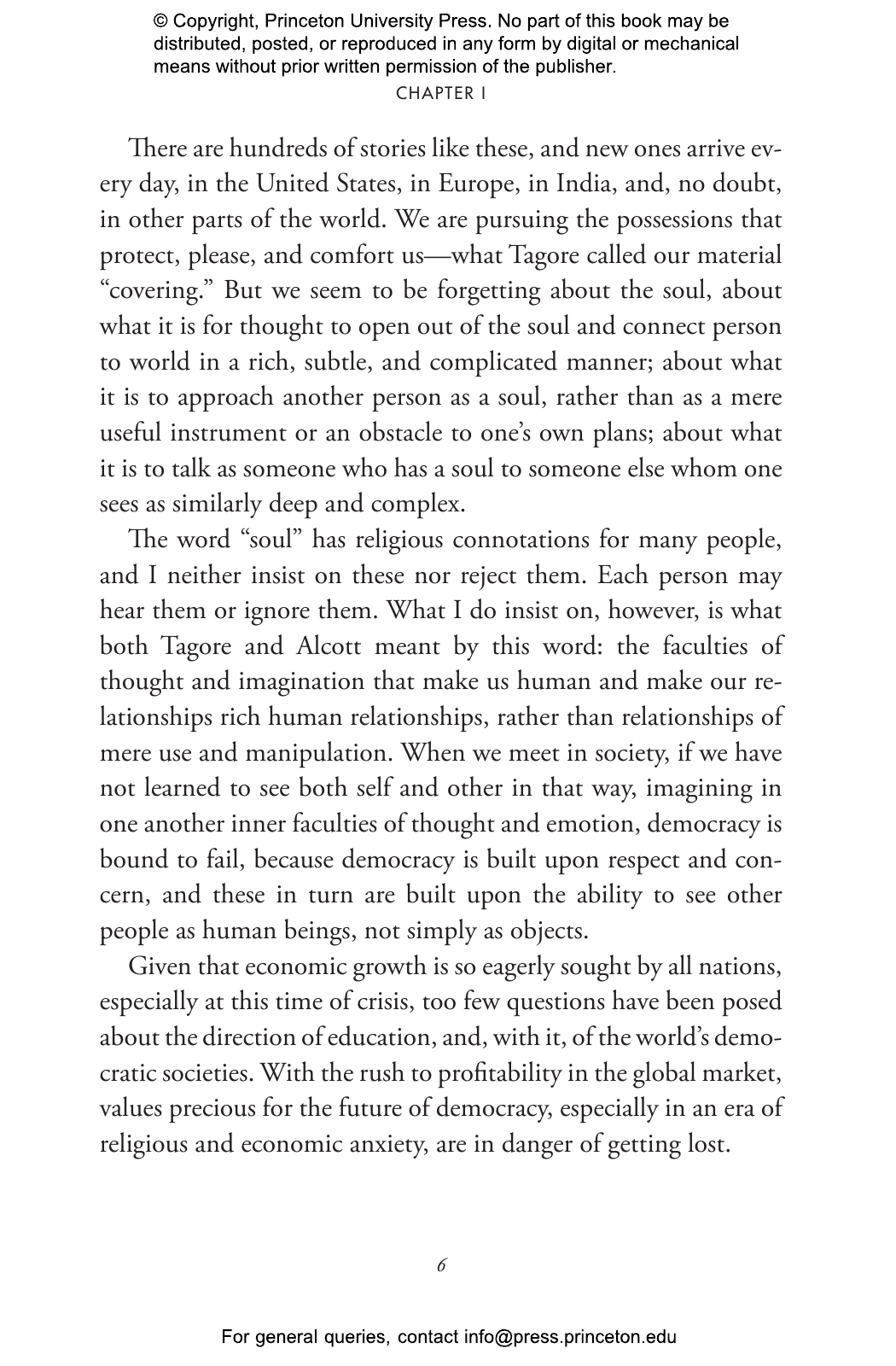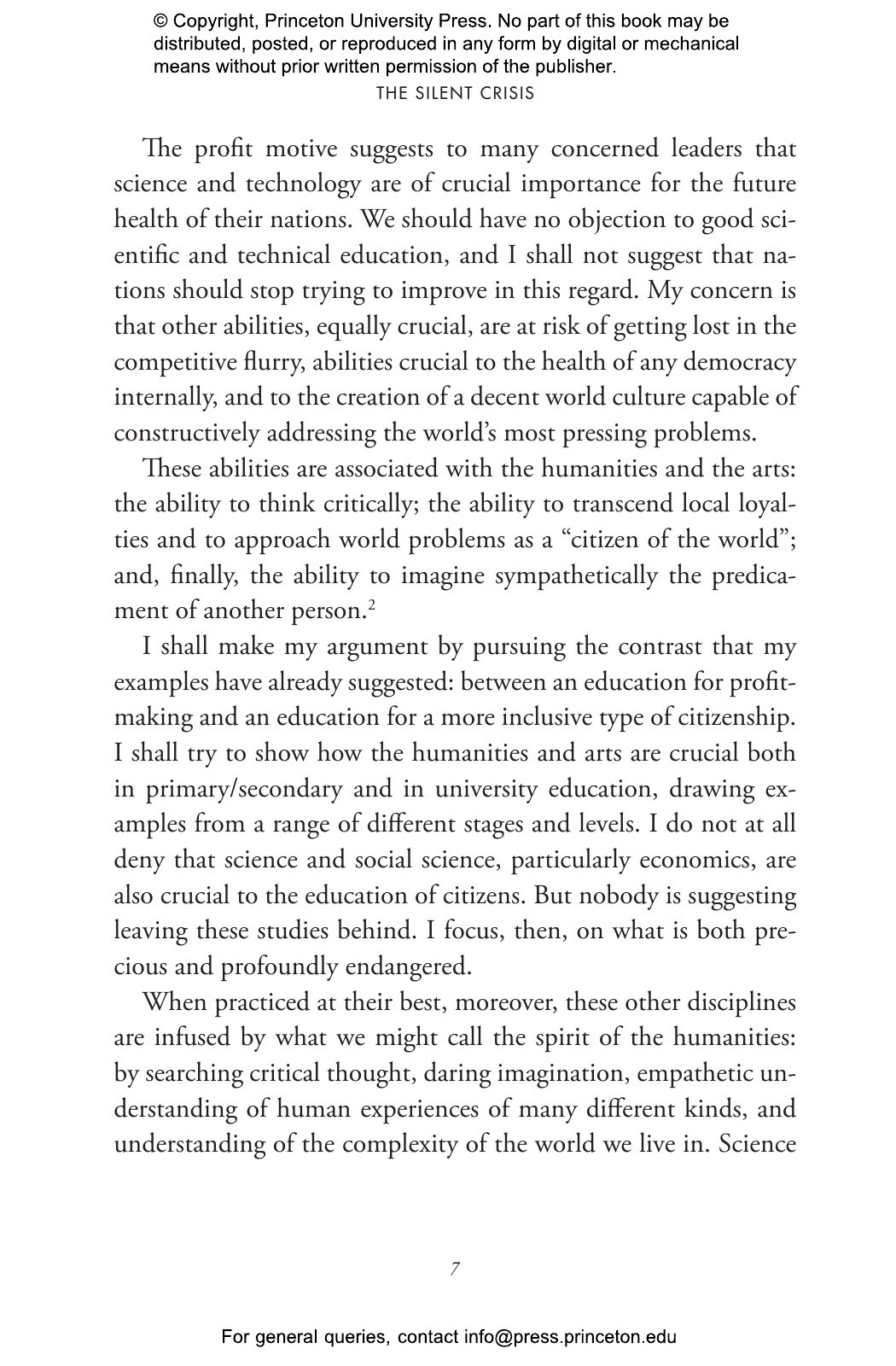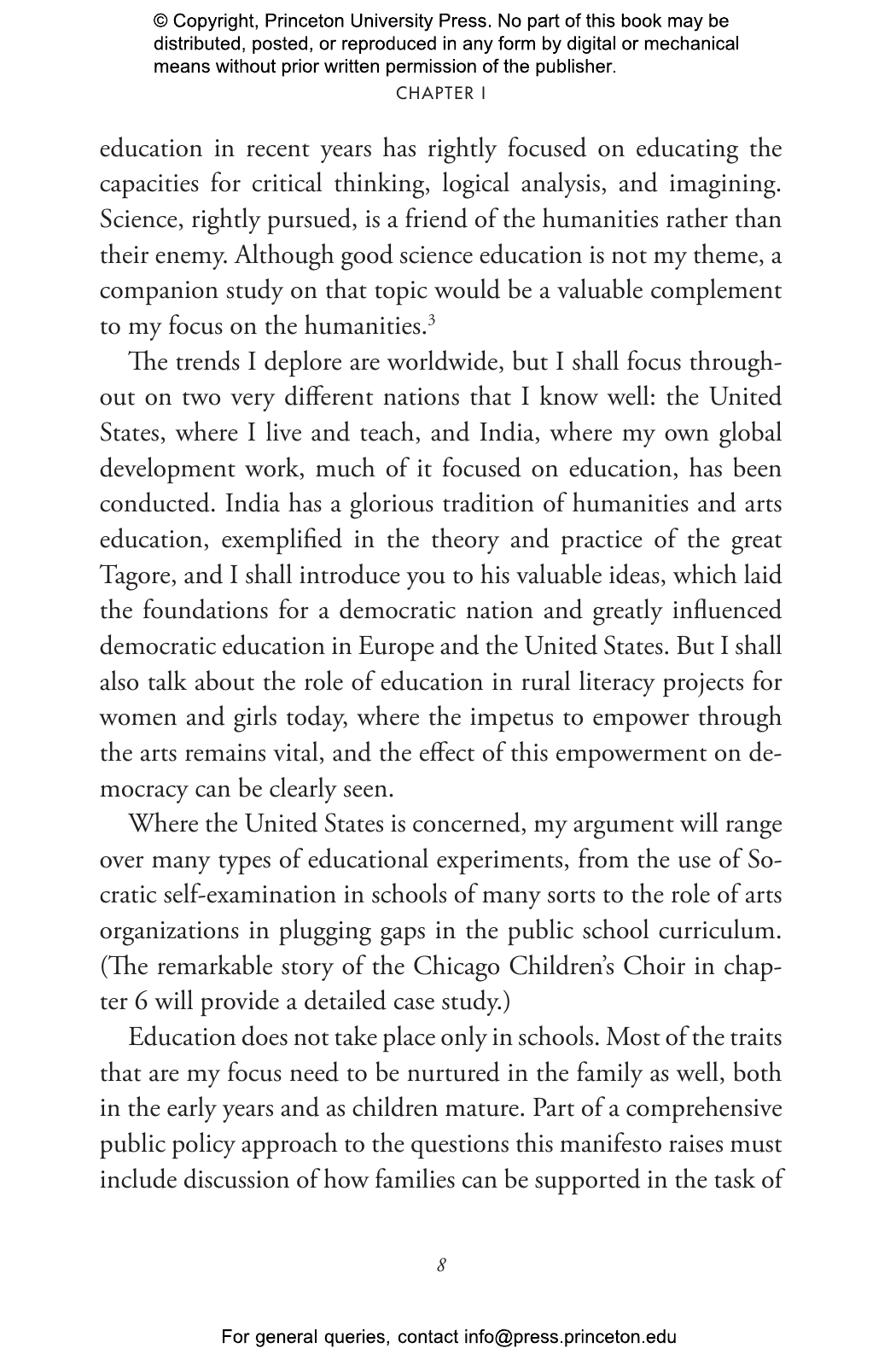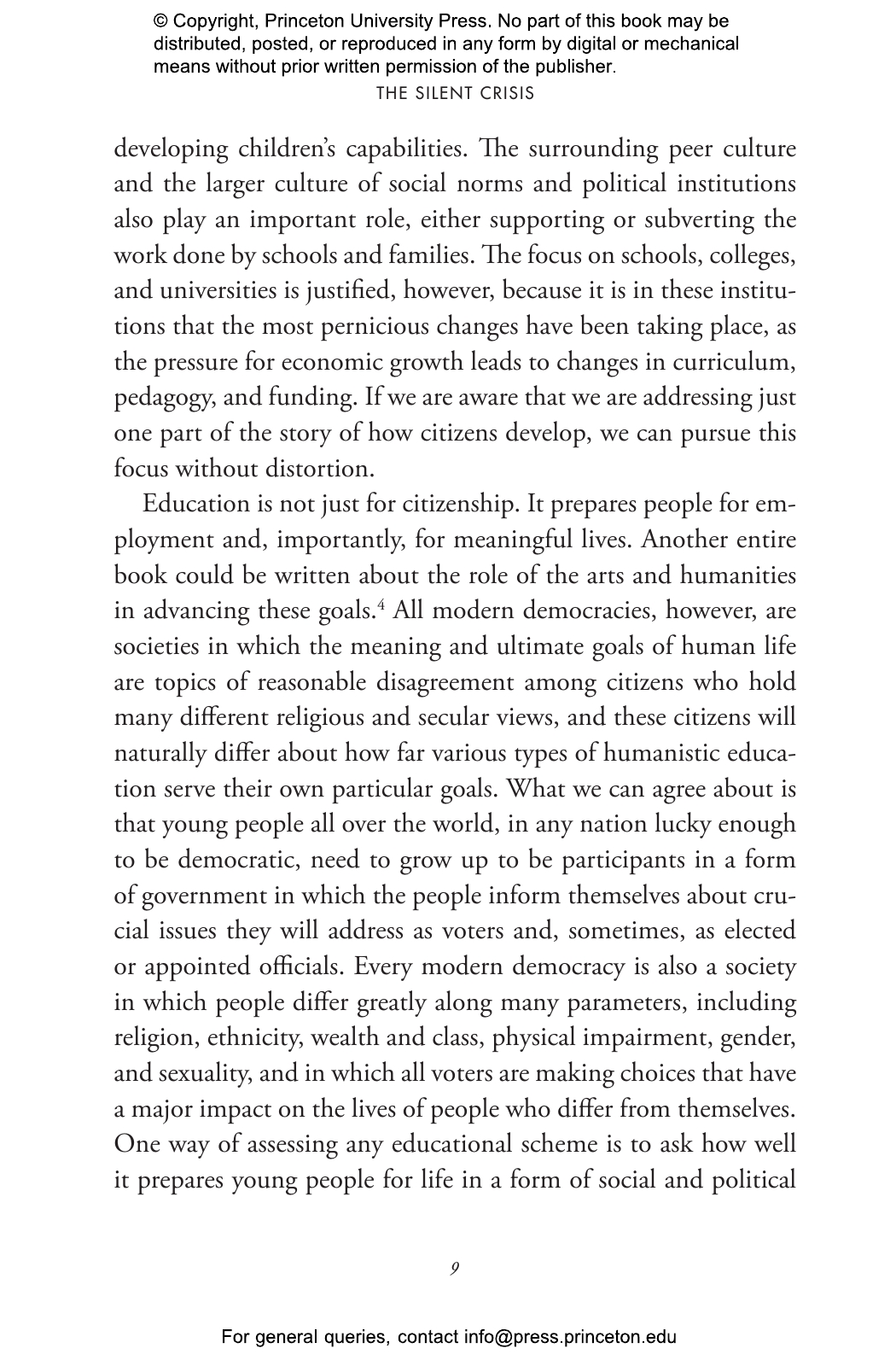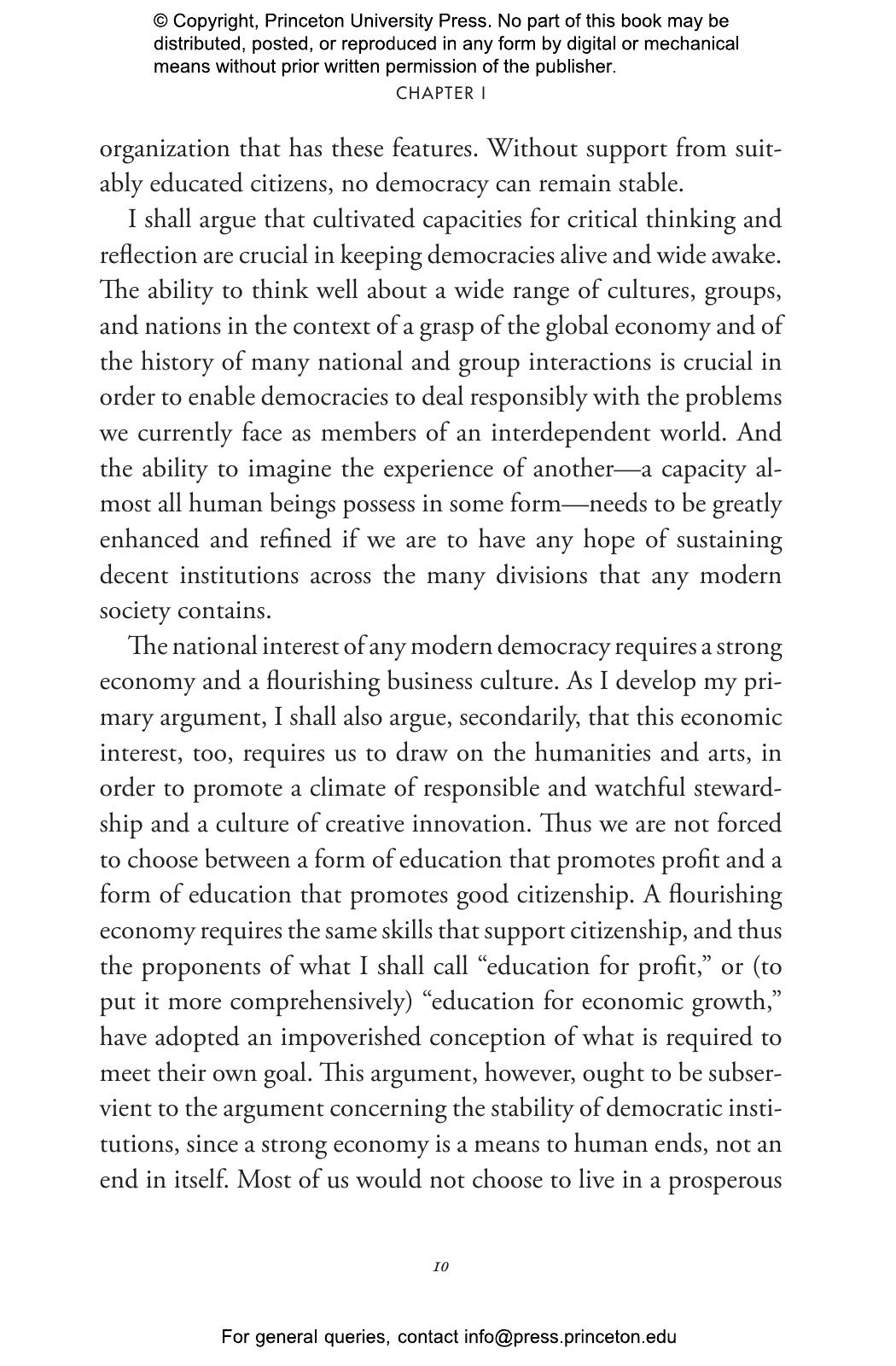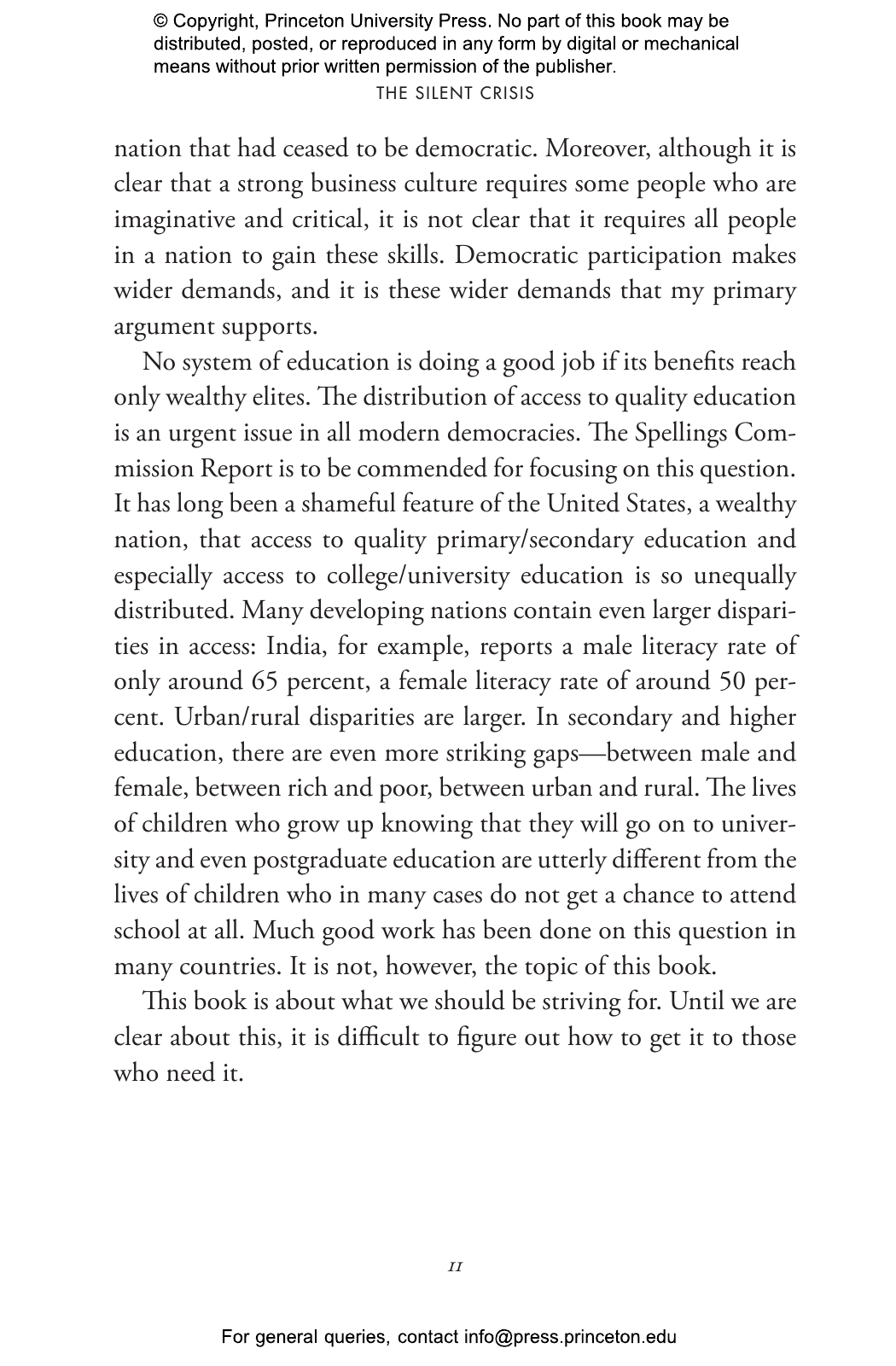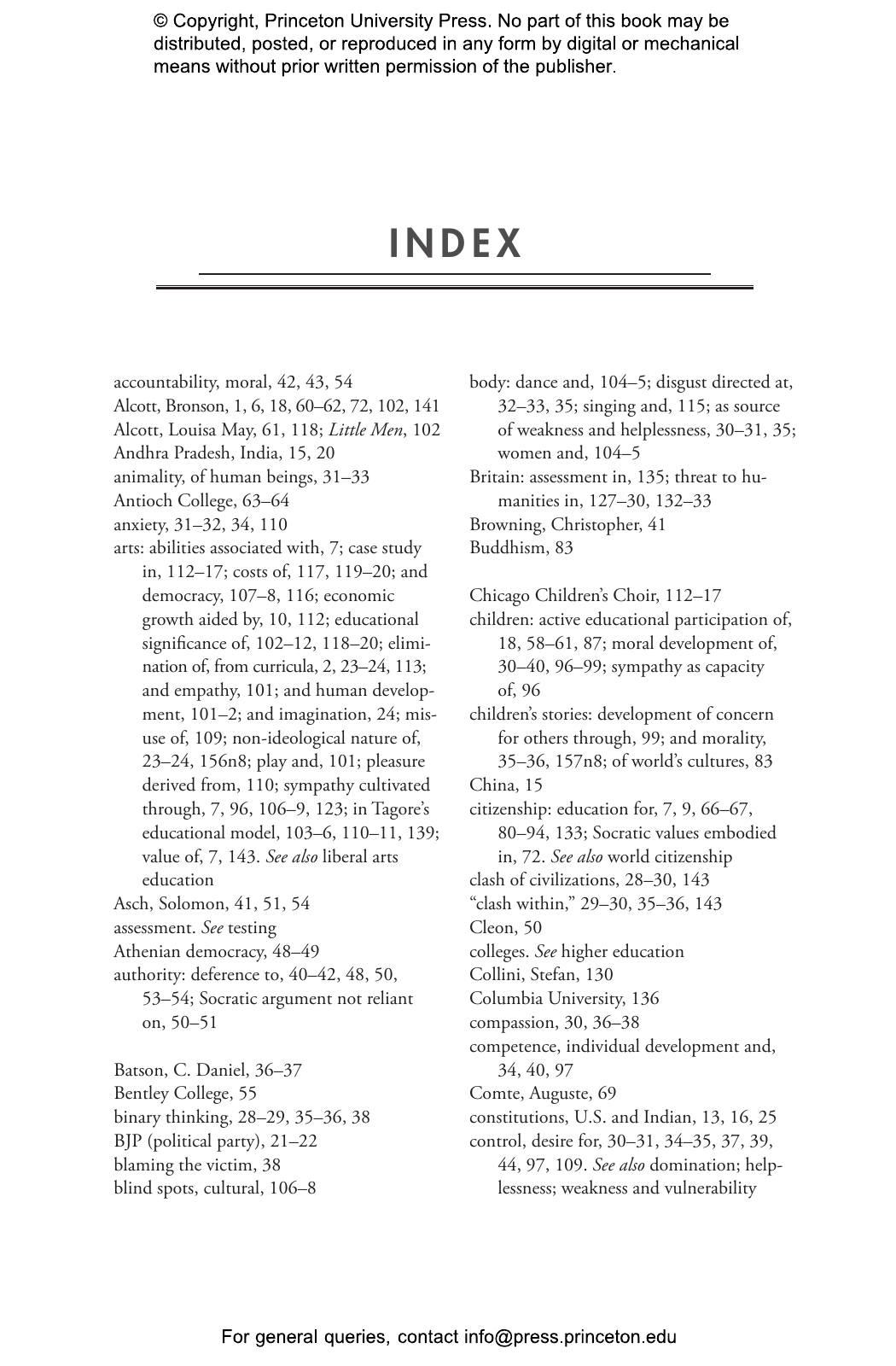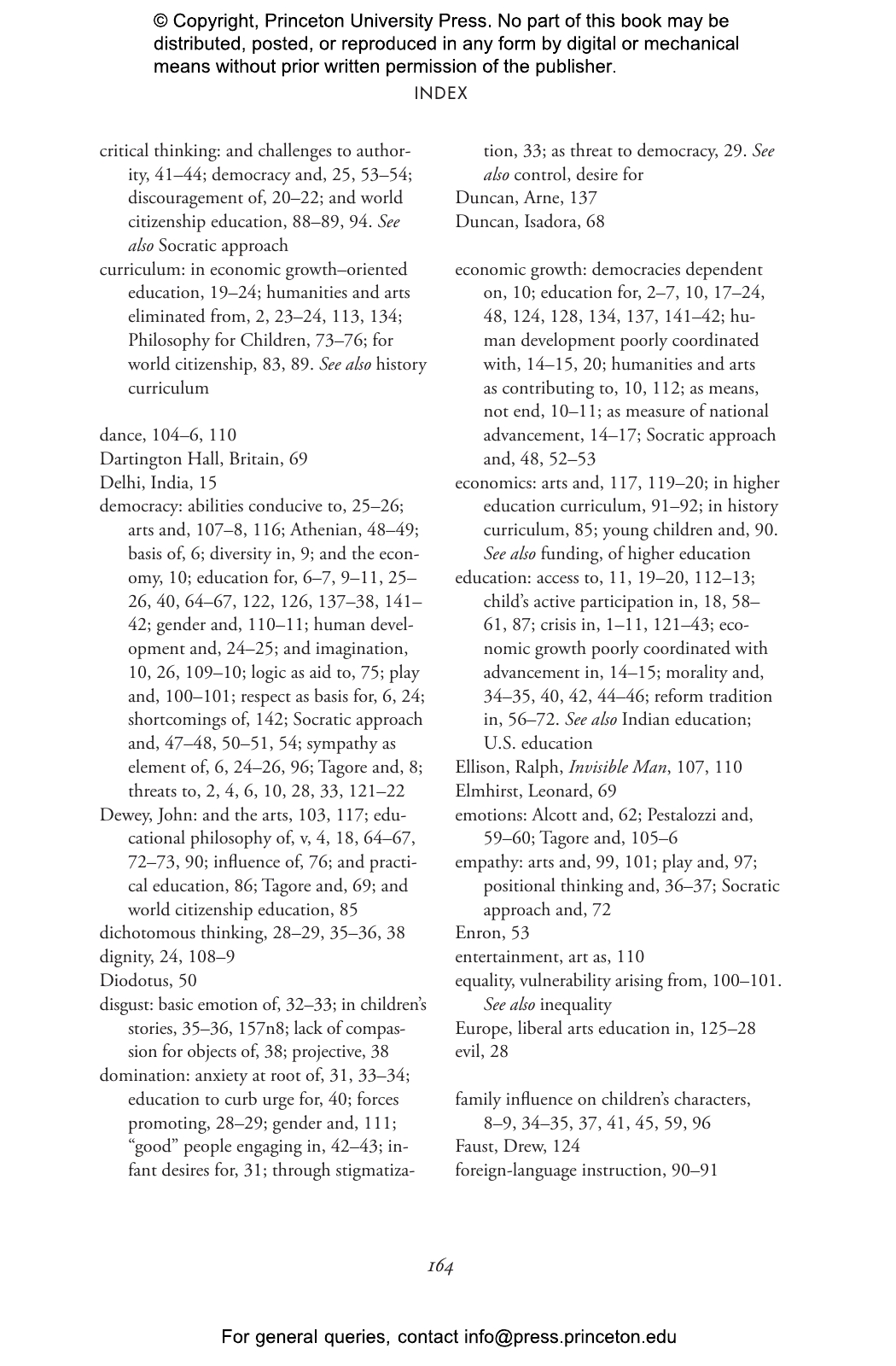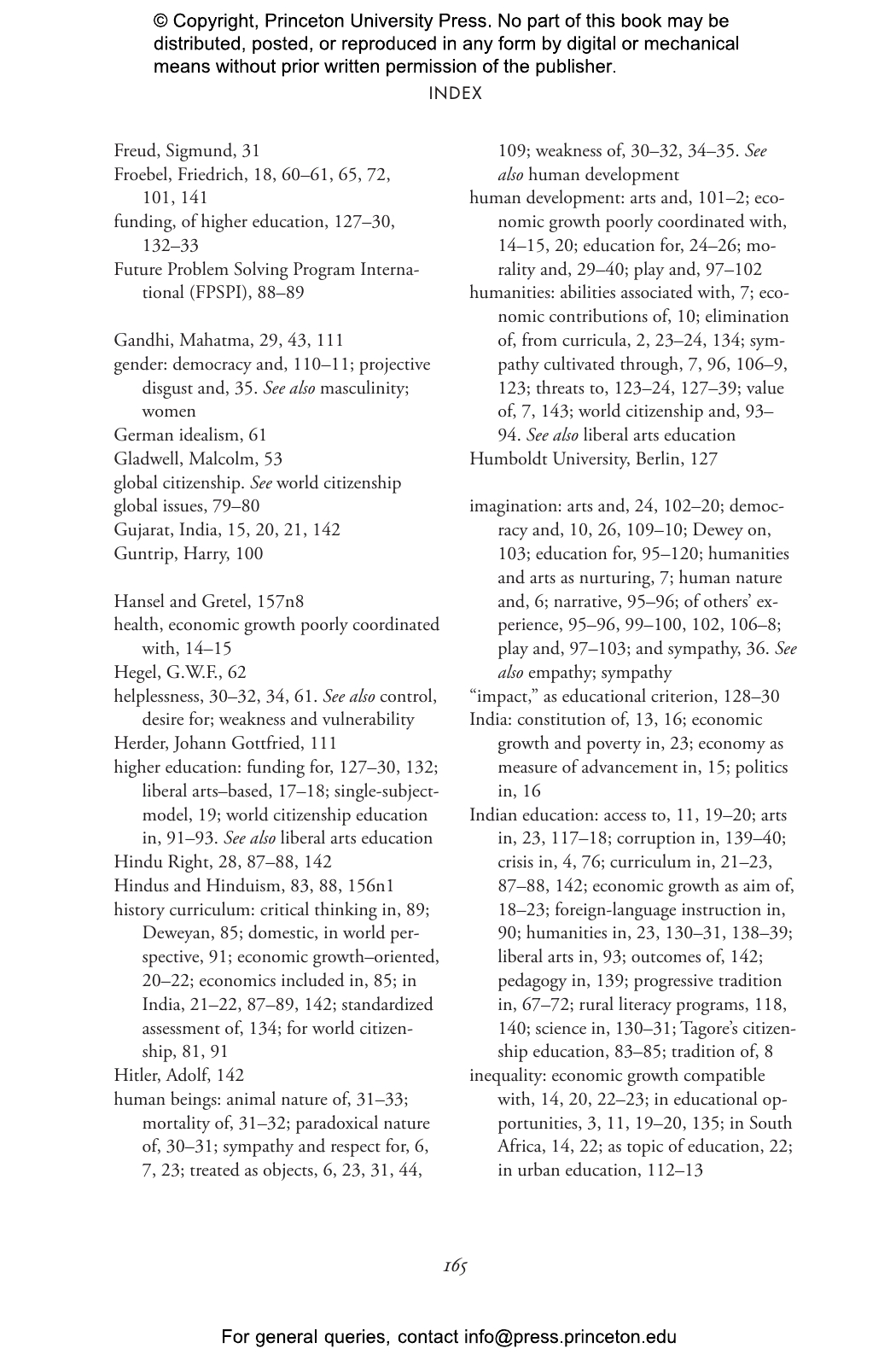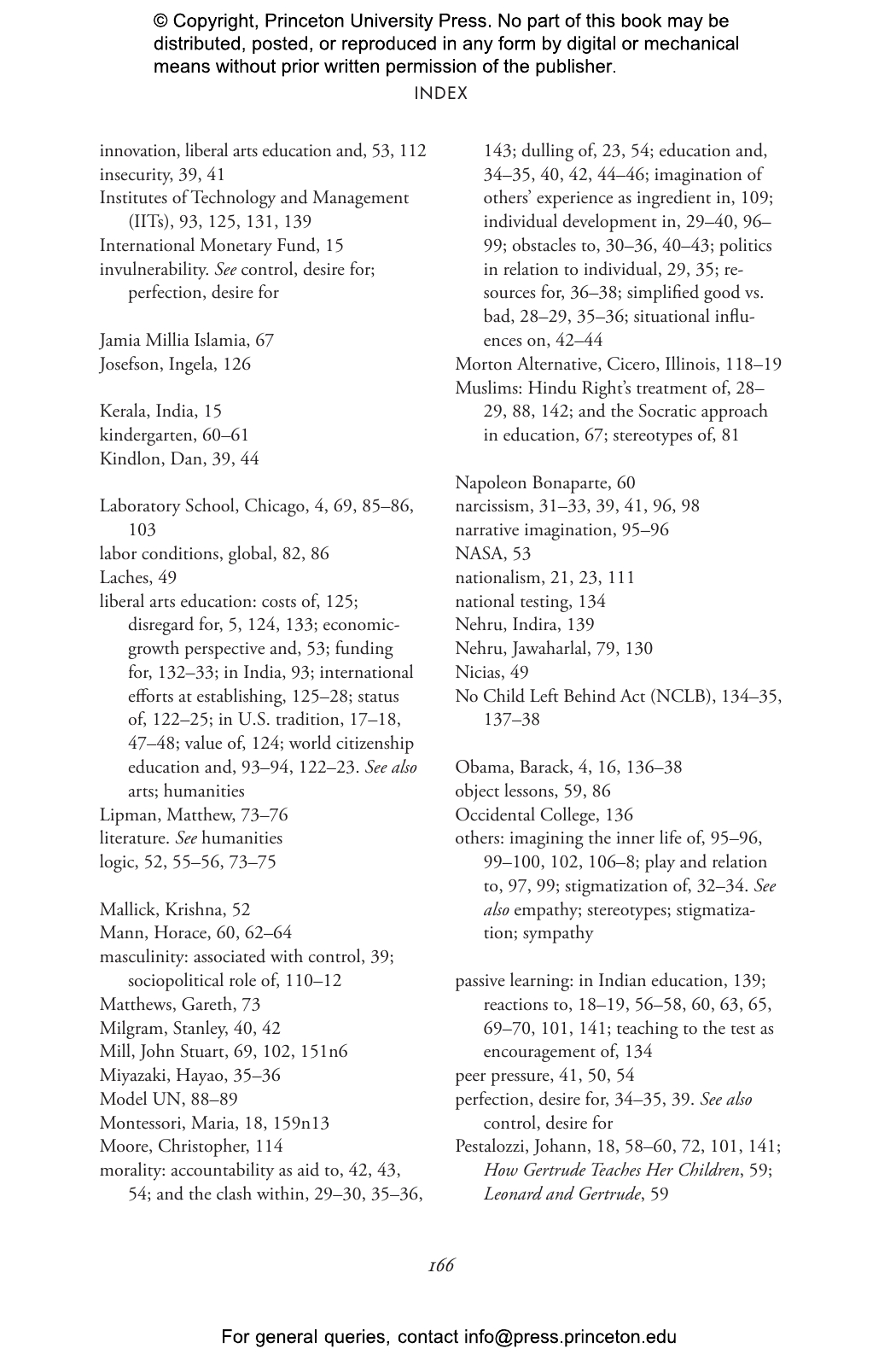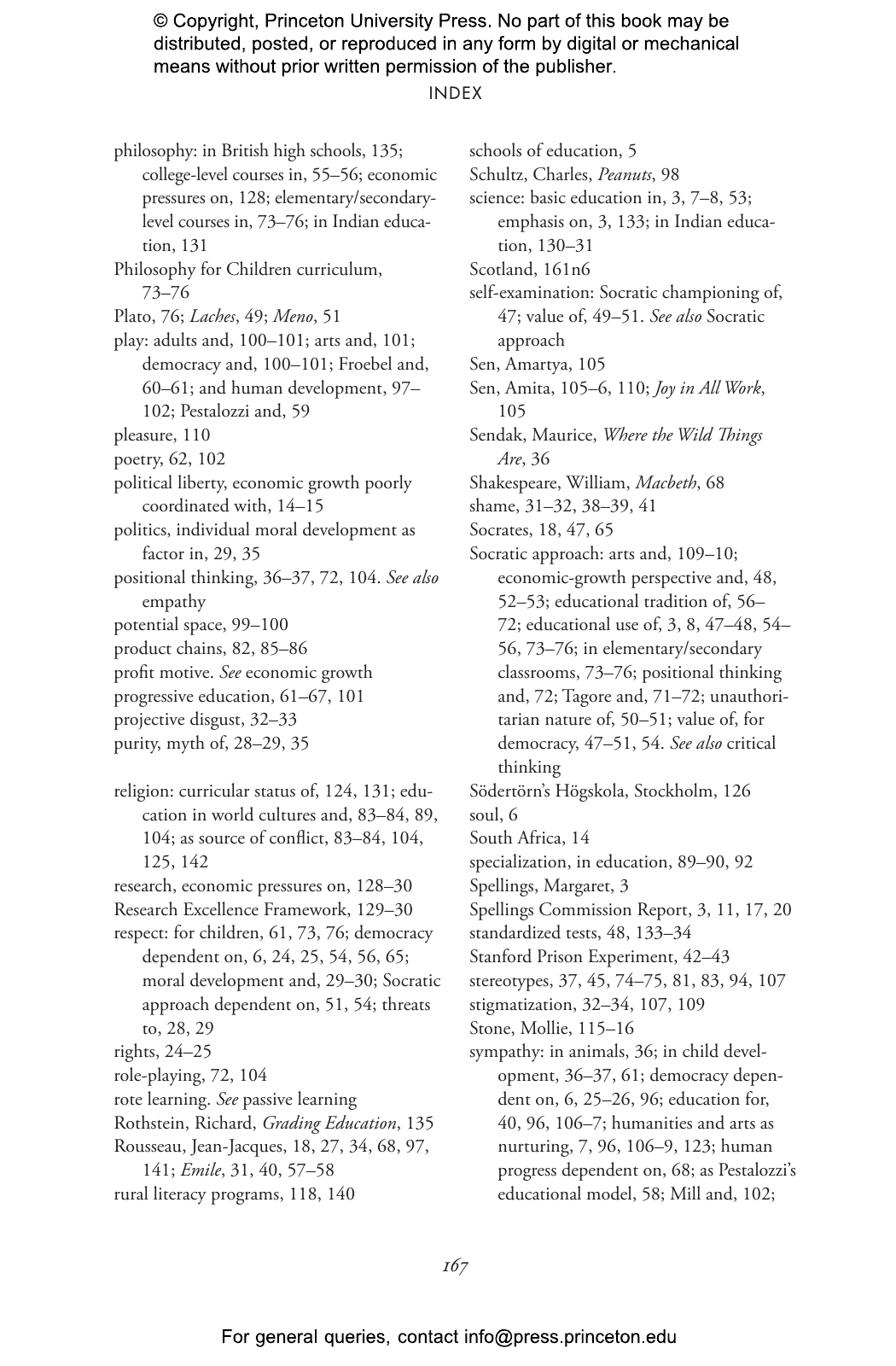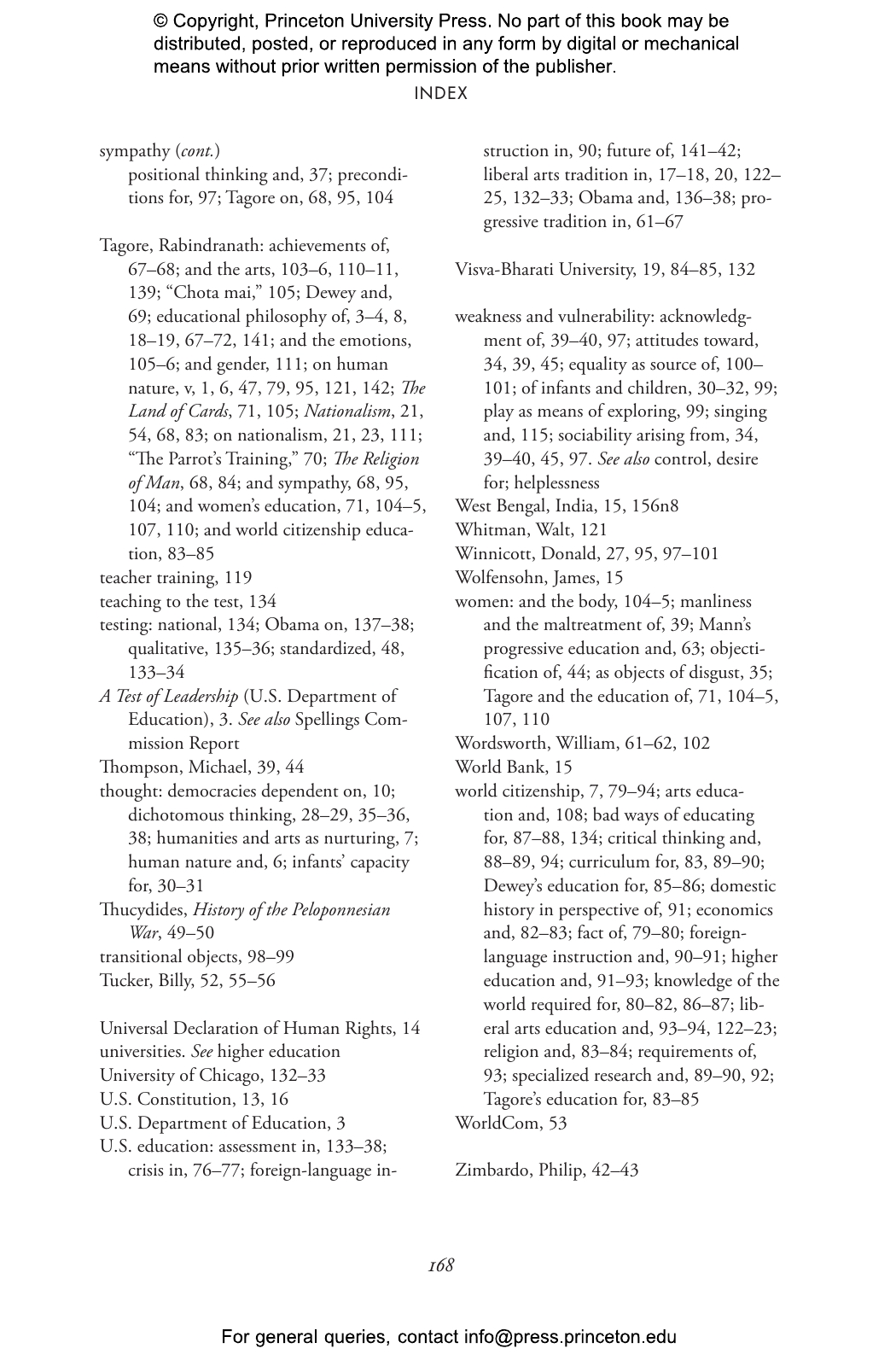In this short and powerful book, celebrated philosopher Martha C. Nussbaum makes a passionate case for the importance of the liberal arts at all levels of education.
Historically, the humanities have been central to education because they have been seen as essential for creating competent democratic citizens. But recently, Nussbaum argues, thinking about the aims of education has gone disturbingly awry in the United States and abroad. We increasingly treat education as though its primary goal were to teach students to be economically productive rather than to think critically and become knowledgeable, productive, and empathetic individuals. This shortsighted focus on profitable skills has eroded our ability to criticize authority, reduced our sympathy with the marginalized and different, and damaged our competence to deal with complex global problems. And the loss of these basic capacities jeopardizes the health of democracies and the hope of a decent world.
In response to this dire situation, Nussbaum argues that we must resist efforts to reduce education to a tool of the gross national product. Rather, we must work to reconnect education to the humanities in order to give students the capacity to be true democratic citizens of their countries and the world.
Translated into twenty-five languages, Not for Profit draws on the stories of troubling—and hopeful—global educational developments. Nussbaum offers a manifesto that should be a rallying cry for anyone who cares about the deepest purposes of education.
"Nussbaum makes a persuasive case."—The New Yorker
"Nussbaum . . . brings to this perennial [education] debate an impassioned urgency . . . and broad erudition. . . . Nussbaum's defense of this worthy cause is deeply learned."—Mick Sussman, New York Times Book Review
"One turns with some relief to Martha Nussbaum's Not for Profit, and her impassioned . . . argument in favor of study of the humanities."—Peter Brooks, New York Review of Books
"Against the commercialisation of the academy, [Nussbaum] poses a sentient, Socratic and cosmopolitan vision of higher education."—Jon Nixon, Times Higher Education
"A comprehensive look at today's worldwide marketplace for college students."—Michael Alison Chandler, Washington Post
"It's an important and timely plea because the pursuit of so-called useful educational results continues apace, and because the threats to humanistic education are indeed profound."—Michael S. Roth, Chronicle of Higher Education
"Moving deftly between analysis and and polemic, the author draws on education practices in India, experimental psychology, the works of such liberal education proponents as Dewey and Tagore to emphasize the importance of critical pedagogy for the development of individual responsibility, innovation, and self-examination. . . . [I]n advocating educational curriculums that recognize the worth of personal development and creative thought, this slim book is itself a small but decisive step in the effort to broaden and enrich current pedagogical practices."—Publishers Weekly
"For Nussbaum, human development means the development of the capacity to transcend the local prejudices of one's immediate (even national) context and become a responsible citizen of the world."—Stanley Fish, New York Times Opinionator Blog
"This is a passionate call to action at a time when the nation is becoming more culturally diverse and universities are cutting back on humanities programs."—Vanessa Bush, Booklist
"Nussbaum's ideals are dynamic. Hers is a cosmopolitan humanism oriented towards global citizenship. . . . [Not for Profit] is not only a spirited defence of the humanities and a lament for their perceived decline, it is a call to action."—Luke Slattery, The Australian
"[A] short, though-provoking book. . . . Not For Profit offers a passionate and persuasive defence of the humanities. While most of the cases Nussbaum discusses are drawn from the US and India, her argument has undoubted relevance for Australia."—Tim Soutphommasane, The Australian
"Nussbaum believes that cutting the liberal arts from our academic programs will lead to undereducated graduates. To make responsible decisions, a student must comprehend more than a limited business-oriented curriculum can provide. . . . Not For Profit is required reading for educational administrators, government analysts, and liberal arts instructors at all levels."—Julia Ann Charpentier, Foreword Reviews
"This book will certainly add weight to Nussbaum's considerable reputation and influence as a major public intellectual. Her core diagnosis is both accurate and compelling. . . . Not for Profit is an important book with an urgent message that should be read and considered by the widest possible audience."—Paul Russell, Globe and Mail
"Nussbaum's defense of the value of the humanities is informed, intelligent and deeply plausible—so much so that many readers might find themselves somewhat at a loss as to how our society, and indeed the world in general, has reached the point where such a book is even needed. What could be more obvious, and thus less in need of a defense, than the claim that a strong grounding in the arts and humanities is a great good, both for the individual and for the society in which she lives?"—Troy Jollimore, Truthdig
"This brief volume incisively argues that higher education around the globe must reprioritize toward preparing students to become 'citizens of the world'—a task that will require schools to cultivate imagination, empathy, and other trademarks of humanistic education. Nussbaum's analysis is a moving reminder of the humanities' practical consequence."—Diversity Web
"Refreshingly free of the policy speak and narrow thinking that often dominate works on the subject. . . . Nussbaum's unorthodox method of defining and then demonstrating the value of the humanities is perhaps the most compelling aspect of her book."—Andrew Benedict-Nelson, Common Review
"As a model of public philosophy, [Not For Profit] is exemplary. . . . There are no pronouncements from on high here, only strong arguments, forcefully made."—Julian Baggini, Philosophers' Magazine
"Nussbaum makes a compelling case for the humanities' continuing value and importance."—David A. Bell, Dissent
"This is a little book with a big, and important, message. . . . Nussbaum has long demonstrated her courage as a public intellectual, and this book articulates the liberal vision that sustains her."—John A. Scott, Philosophy in Review
"Excellently written."—Herman De Dijn, Ethical Perspectives
"A compact, animated, and mellifluous defense of the humanities that makes a powerful case for the ethical imperative of providing the younger generations of the world's democracies with a critical, engaged, liberal-arts-based education."—Erin McGlothlin, Belles Lettres
"Not for Profit: Why Democracy Needs the Humanities is refreshing in being a scholarly work in the humanities and social sciences from a US author that is not wholly preoccupied with the US. Indeed, one of the most interesting facets of Nussbaum's work is her comparison of both the historical development and current position of education in the US with education in India which she clearly knows reasonably well."—Gavin Moodie, Journal of Higher Education Policy and Management
"Resolutely vigorous and committed, honed for the purpose of public debate."—Solange Chavel, Books & Ideas
"Martha Nussbaum is the most erudite and visionary scholar writing on higher education today. Once again, she has laid out a novel and compelling argument with all of the clarity and rigor we expect from her writing. Not for Profit reminds us all that the deeper purposes of liberal education go well beyond personal advancement or national competitiveness. The real project is to educate responsible global citizens who will champion democracy and human development, and who have the skills to collaborate across differences and borders to solve pressing global problems."—Grant H. Cornwell, president of Rollins College
"This book could not be more timely nor more on target. Martha Nussbaum argues that education has become increasingly utilitarian, market-driven, career-oriented, and impoverished in its attention to the arts and humanities. The arts and humanities don't necessarily make people humane and creative, but they are, Nussbaum argues, required for Socratic examination and self-examination. If we agree with Socrates that the unexamined life is not worth living, then we need Nussbaum's argument."—Peter Brooks, Princeton University
"This is an important book and a superb piece of writing, combining passionate enthusiasm with calm arguments and informative examples. Written with a lovely light touch, it introduces the reader to the much misunderstood history of progressive education and shows its contemporary relevance."—Harry Brighouse, University of Wisconsin–Madison


